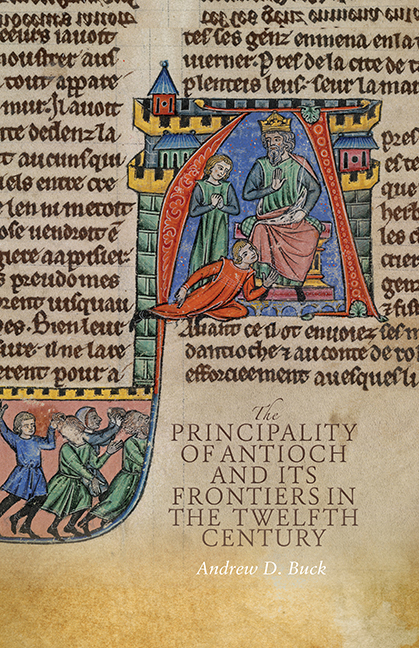Book contents
- Frontmatter
- Contents
- List of Maps
- Acknowledgements
- Abbreviations
- Introduction
- 1 The Extent of the Principality
- 2 The Rulers of Antioch
- 3 Central Governance and Military Service
- 4 Lordship in the Principality
- 5 A Frontier Society? The Nature of Intercultural Relations
- 6 Relations with Byzantium
- 7 Antioch and the Latin East
- Conclusion
- Bibliography
- Index
Introduction
Published online by Cambridge University Press: 09 May 2017
- Frontmatter
- Contents
- List of Maps
- Acknowledgements
- Abbreviations
- Introduction
- 1 The Extent of the Principality
- 2 The Rulers of Antioch
- 3 Central Governance and Military Service
- 4 Lordship in the Principality
- 5 A Frontier Society? The Nature of Intercultural Relations
- 6 Relations with Byzantium
- 7 Antioch and the Latin East
- Conclusion
- Bibliography
- Index
Summary
Situated at the easternmost edge of Latin Christendom, the principality of Antioch offered profound challenges to its inhabitants. Founded in 1098 by the Norman adventurer and First Crusade leader, Bohemond of Taranto, its territorial extent – based largely on a former duchy of the Byzantine Empire – acted as a meeting point between Asia Minor, Syria and Mesopotamia. This brought the newly arrived Latin Christians – described more generally as Franks – into contact with a nearly incomparable wealth of religious and political groups, both internally and externally. Incorporated within this were numerous Eastern Christian communities and powers, such as Byzantium and the Greek Orthodox Church, the Armenians, including the independent warlords of Cilicia, the Syriac Jacobites and the Melkites, the latter of whom were liturgically Greek but spoke Arabic. Likewise, there were Sunni Muslim peoples and potentates theoretically linked to the Abbasid Caliphs of Baghdad, such as those of Aleppo, Mosul and the Seljuk and Danishmend Turks of Asia Minor, as well as Shi'a Muslims, including the enigmatic Isma'ili sect, famously known as the Assassins. Finally, there were other Latin powers to contend with, including Western kings and states, the papacy, the military orders and even the other Crusader States. In addition to this were numerous topographical challenges, such as the various mountain ranges and limestone massifs which dotted the region and hampered easy settlement and movement, as well as the Orontes River that bisected the principality. The maintenance of Antioch's authority thus demanded a delicate balance of diplomacy, warfare and political reactivity in order to counter the political and geographical demands placed upon its ruling elites.
- Type
- Chapter
- Information
- Publisher: Boydell & BrewerPrint publication year: 2017



